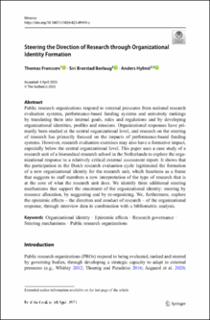Steering the Direction of Research through Organizational Identity Formation
Peer reviewed, Journal article
Published version
Permanent lenke
https://hdl.handle.net/11250/3067946Utgivelsesdato
2023Metadata
Vis full innførselSamlinger
Originalversjon
10.1007/s11024-023-09494-zSammendrag
Public research organizations respond to external pressures from national research evaluation systems, performance-based funding systems and university rankings by translating them into internal goals, rules and regulations and by developing organizational identities, profiles and missions. Organizational responses have primarily been studied at the central organizational level, and research on the steering of research has primarily focused on the impacts of performance-based funding systems. However, research evaluation exercises may also have a formative impact, especially below the central organizational level. This paper uses a case study of a research unit of a biomedical research school in the Netherlands to explore the organizational response to a relatively critical external assessment report. It shows that the participation in the Dutch research evaluation cycle legitimated the formation of a new organizational identity for the research unit, which functions as a frame that suggests to staff members a new interpretation of the type of research that is at the core of what the research unit does. We identify three additional steering mechanisms that support the enactment of the organizational identity: steering by resource allocation, by suggesting and by re-organizing. We, furthermore, explore the epistemic effects – the direction and conduct of research – of the organizational response, through interview data in combination with a bibliometric analysis.
